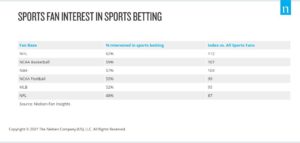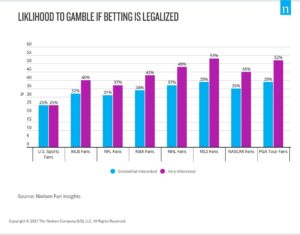
Turn on any live sporting event these days and you’ll likely see an abundance of ads during the commercial breaks enticing engaged fans to get in on the action by betting on various aspects of the games and matches they’re watching. Already a $154 million game in U.S. local TV spot advertising, online sports betting is the latest way that a handful of prolific gambling brands are tapping into the $780 billion opportunity that the country’s 7.3 million daily fantasy bettors bring to the table. But are they appealing to the right fans, focusing on the right sports and considering interested fans that have not yet rolled the dice?
To set the stage, let’s consider the NFL, which is the most popular and most viewed sports league in the U.S. According to Nielsen Fan Insights, the NFL’s mass appeal does not automatically translate into a high percentage of fans interested in sports betting. In fact, across six sports leagues, NFL fans are the least interested in sports betting. So while the sheer volume of NFL fans represents an opportunity, these fans currently aren’t as engaged with sports betting as the prowess of the league might suggest. Comparatively, 62% of NHL fans are interested in sports betting—the highest among six major sports leagues.

Interestingly, an interest in betting on certain sports doesn’t always correlate with which sports bettors are watching. For example, interest in NHL betting is very high, but interest in watching ice hockey among bettors is low when compared against the other major sports leagues. That’s the flipside of what we see for the NFL—even though NFL viewership among sports bettors is the highest (tied with the NBA).
The notable ramp up in online sports gambling ads on TV has elevated the category to rank 11th among 1,200 product categories for spot TV advertising dollars, accounting for 2.1% share. In terms of the audience for those ads, just under one-third (32%) of the U.S. population already has an interest in sports betting, but a total of 46% have at least some interest, highlighting an opportunity for future growth. And when we look at the actual opportunity, we see that the portion of the U.S. population that lives in households with incomes of more than $125,000 is much more interested in sports betting than the general population (48%).
Not surprisingly, sports fans should be the key target for any brand or platform involved with sports betting as 55% say they’re interested in sports betting. That’s 72% more likely than U.S. adults. Importantly, interest in betting and the ability to participate are two different things, as some of an intendor’s ability to bet hinges on whether it’s legal where they live. With pro-gambling legislation pending in seven states, the opportunity for brands, TV networks and sports fans is poised to grow well beyond the confines of the 22 states where sports gambling is already legal.
The pending legalization in new states is critical from a growth perspective, as fans interested in each league say they would be more interested in gambling if it was legal where they live. In addition to growing more engaged with the sports, the increased interest in gambling would be a boon for online gaming operators like FanDuel and DraftKings, as sports betting services are the most common channel for placing a bet. Other popular options include sports pools with family, friends and coworkers, and sportsbooks (on- and offline).
MLS and PGA Tour fans indicate the highest likelihood to bet on sports if it were legalized with over half responding that they are very likely to bet.

In addition to bolstering the local TV advertising market, the rising interest in and engagement with sports gambling represents a notable opportunity in the sponsorship market. FanDuel and MGM, for example, have leveraged league-wide deals to provide exposure opportunities with each of the teams in the NBA and MLS, respectively. And the NHL and Betway recently announced a new multi-year partnership making Betway the official sports betting partner of the NHL in the U.S. The deal will provide Betway with significant exposure via visible signage during NHL broadcasts and league events, which is a growing trend. Across the NBA, NFL, NHL, MLB and MLS, more than 60 brands benefitted from visible stadium signage during TV broadcasts of games and matches during the last season.
The implications for the sports betting world are fairly straightforward. In just a short time (following a 2018 Supreme Court verdict), online sports betting has become a burgeoning industry with a growing opportunity for brands, sports leagues, rights holders and TV networks. Specifically, 46% of American adults have at least some interest in sports betting. That equates to 106 million people, which is significantly more than 7.3 million who are already daily fantasy bettors. And with a handful of states considering some form of sports betting, the odds are only going to increase over time.
For more information on sports bettor demographics or Nielsen Fan Insights, please Contact Us.